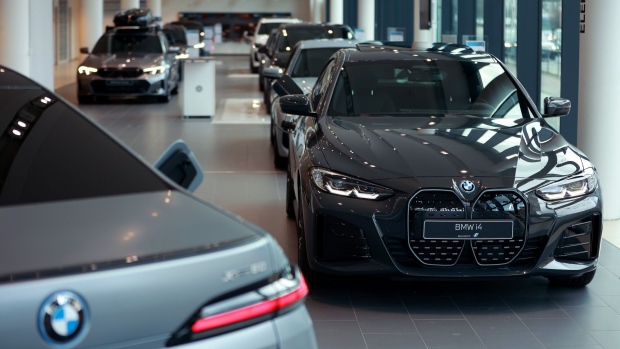Mar 15, 2023
BMW Says EVs, High-End Models to Drive Steady Profit in 2023
, Bloomberg News

(Bloomberg) -- BMW AG expects 2023 profit margins around last year’s level as sales of its most expensive vehicles like the 7-Series offset weaker pricing for entry-level luxury models.
Automaking returns are expected to stay between 8% and 10% this year, in line with long term targets, the Munich-based carmaker said Wednesday. BMW said deliveries will likely tick higher after dropping nearly 5% last year due to supply chain disruptions.
“Our order books are very high still after high demand last year, which will will carry us through the next couple of months,” BMW Chief Executive Officer Oliver Zipse said in an interview with Bloomberg Television. “We currently have one of the youngest product portfolios in the industry. That gives us a lot of pricing power.”
Luxury-car makers like BMW have withstood economic headwinds as demand for the most expensive vehicles remained robust. But with high energy prices continuing to stoke inflation, higher interest rates and faltering consumer confidence, German auto manufacturers are growing pessimistic, a recent survey showed.
BMW also expects global markets to cool this year. While the company forecasts demand to remain stable, prices for new and used cars will settle after increases in 2022. The shares declined 1.8% at 11:25 a.m. in Frankfurt trading.
Sales of upper luxury vehicles like the 7-Series and Rolly-Royce models are set to rise in the “mid-double digits” percentage range, BMW said, helping to stave off drag from slowing price growth and high costs.
Rising expenditures for materials and logistics will continue to weigh on profit this year, Chief Financial Officer Nicolas Peter said. BMW faced an additional €2.5 billion ($2.7 billion) headwind last year from the surge in prices.
EV Growth, IRA
After doubling sales of battery-only powered BMW and Mini brand cars last year, BMW said sales of pure-electric vehicles will likely account for 15% of total deliveries this year, up from 9%. The company now expects fully electric models to account for 50% of total sales well ahead of 2030.
To expand its US plant in South Carolina, BMW will take advantage of tax credits under the US Inflation Reduction Act.
“The US recognizes that there is a relation between industry, value added and manufacturing,” Zipse said. “Europe would be well advised to follow suit.”
Zipse also confirmed that BMW is investing in its Oxford plant, where it makes Mini models, also citing “good talks” with the government for subsidies to make e-Minis. The move is a bright spot for the UK after auto production slumped to a 66-year low last year.
Mini Plant
“We are investing in Oxford and we are getting support from the government on our EV push,” Zipse said. “We will continue to look at the UK as a place for investment because, especially Mini and Rolls-Royce, these are English brands.”
BMW said last week its 2022 earnings before interest and tax rose to €3.5 billion in the fourth quarter, with its margin on carmaking reaching 8.6%, at the higher end of its guidance.
(Updates with CEO comments in ninth paragraph)
©2023 Bloomberg L.P.


